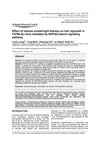 September 2020 in “International journal of computer science and mobile computing”
September 2020 in “International journal of computer science and mobile computing” Low-level laser therapy can stimulate hair growth and increase hair density, making it a promising treatment for hair loss.
 8 citations,
November 2020 in “Optics and Laser Technology”
8 citations,
November 2020 in “Optics and Laser Technology” LED light therapy is effective for skin and hair treatments but requires careful use to minimize risks.
 7 citations,
March 2016 in “Journal of Cosmetic and Laser Therapy”
7 citations,
March 2016 in “Journal of Cosmetic and Laser Therapy” Home-use lasers and IPL devices are unlikely to directly cause paradoxical hair growth; it may be linked to inflammation or hormonal issues.
 27 citations,
December 2001 in “Clinical and experimental dermatology”
27 citations,
December 2001 in “Clinical and experimental dermatology” Different hair removal methods have pros and cons, and more evidence is needed to prove laser treatments work.
 32 citations,
January 2010 in “Dermatology”
32 citations,
January 2010 in “Dermatology” Combining laser hair removal with topical eflornithine is recommended for better results in treating unwanted facial hair.
16 citations,
April 2020 in “Dermatology practical & conceptual” Laser treatment can effectively reduce unwanted hair growth, particularly for people with fair skin and dark hair.
 July 2018 in “Elsevier eBooks”
July 2018 in “Elsevier eBooks” New hair loss treatments show promise, but more research is needed to confirm their effectiveness.
 1 citations,
April 2022 in “The Egyptian Journal of Hospital Medicine ”
1 citations,
April 2022 in “The Egyptian Journal of Hospital Medicine ” Fractional laser therapy may help regrow hair in alopecia areata.
 7 citations,
March 2017 in “Actas Dermo-Sifiliográficas”
7 citations,
March 2017 in “Actas Dermo-Sifiliográficas” Several new treatments for different types of hair loss show promise in improving patient quality of life.
 7 citations,
April 2021 in “British Journal of Dermatology”
7 citations,
April 2021 in “British Journal of Dermatology” Topical tofacitinib may effectively and safely regrow facial hair in some people with alopecia areata.
 31 citations,
September 2014 in “Journal of Pharmaceutical Sciences”
31 citations,
September 2014 in “Journal of Pharmaceutical Sciences” Using a special laser can improve how well hair loss treatments get into the skin and hair follicles.
 26 citations,
May 2017 in “Lasers in Medical Science”
26 citations,
May 2017 in “Lasers in Medical Science” Laser therapy and hair growth factors significantly improve hair density in male baldness.
 14 citations,
March 2012 in “Lasers in Surgery and Medicine”
14 citations,
March 2012 in “Lasers in Surgery and Medicine” A low-power, fast laser safely reduces hair with minimal pain and few side effects.
 3 citations,
January 2021 in “Plastic and Aesthetic Research”
3 citations,
January 2021 in “Plastic and Aesthetic Research” Hair loss reduces hair thickness and coverage, but drug treatments mainly revive dormant hairs rather than reverse thinning; patients often undervalue their hair loss severity.
 26 citations,
April 1999 in “Dermatologic Clinics”
26 citations,
April 1999 in “Dermatologic Clinics” The long-pulsed alexandrite laser is effective for hair reduction, particularly for light-skinned individuals with dark hair, but caution is needed for darker skin.
 22 citations,
June 2002 in “Seminars in cutaneous medicine and surgery”
22 citations,
June 2002 in “Seminars in cutaneous medicine and surgery” Laser hair removal works well for people with dark hair and light skin, but it's less effective for light hair or dark skin; improvements are expected.
 15 citations,
February 2008 in “Annals of plastic surgery”
15 citations,
February 2008 in “Annals of plastic surgery” Most patients were satisfied with diode laser hair removal and experienced no long-term side effects.
 4 citations,
May 2021 in “Lasers in Surgery and Medicine”
4 citations,
May 2021 in “Lasers in Surgery and Medicine” Light therapy reduces scalp inflammation, boosts hair regrowth with Minoxidil 2%.
 1 citations,
September 2023 in “Curēus”
1 citations,
September 2023 in “Curēus” Using a laser to remove hair in the urethra after hypospadias repair is effective and minimally invasive.
 January 2025 in “Lasers in Medical Science”
January 2025 in “Lasers in Medical Science” Combining fractional CO2 laser with topical dutasteride is more effective for treating male hair loss than using the laser alone.
 1 citations,
May 2018 in “Tropical Journal of Pharmaceutical Research”
1 citations,
May 2018 in “Tropical Journal of Pharmaceutical Research” Intense pulsed-light therapy helps mice grow hair by activating a specific growth pathway.
 72 citations,
January 2001 in “Drugs”
72 citations,
January 2001 in “Drugs” Minoxidil and finasteride treat hair loss; more research needed for other options.
21 citations,
April 2019 in “Journal of cosmetic and laser therapy” Laser hair removal is popular for long-term hair reduction but carries risks, requiring well-trained operators and better regulations, especially in South Africa.
 14 citations,
January 2018 in “Scientific reports”
14 citations,
January 2018 in “Scientific reports” Bioluminescence imaging can track hair follicle cells and help study hair regrowth.
 12 citations,
July 2015 in “Veterinary Dermatology”
12 citations,
July 2015 in “Veterinary Dermatology” Microneedling helped two Pomeranian dogs with a hair growth disorder grow back 90% of their fur in 12 weeks, and the results lasted for a year.
 98 citations,
May 2008 in “British Journal of Dermatology”
98 citations,
May 2008 in “British Journal of Dermatology” There are many treatments for permanent hair loss disorders, but their effectiveness varies and there's no clear best option.
 4 citations,
January 2022 in “Drug design, development and therapy”
4 citations,
January 2022 in “Drug design, development and therapy” Intramuscular corticosteroids are effective and safe for severe alopecia areata, with most patients regrowing hair, but nearly half may relapse.
 73 citations,
April 1999 in “Dermatologic Clinics”
73 citations,
April 1999 in “Dermatologic Clinics” Lasers and light sources can effectively remove hair, work best on fair skin with dark hair, and usually need multiple treatments.
 1 citations,
July 2016 in “British Journal of Dermatology”
1 citations,
July 2016 in “British Journal of Dermatology” Men with a certain type of hair loss often use facial moisturizers, and a specific antibiotic treatment may help another hair condition.
 February 2024 in “Curēus”
February 2024 in “Curēus” Regional nerve blocks are better than ring blocks for pain relief during PRP hair treatment.




























